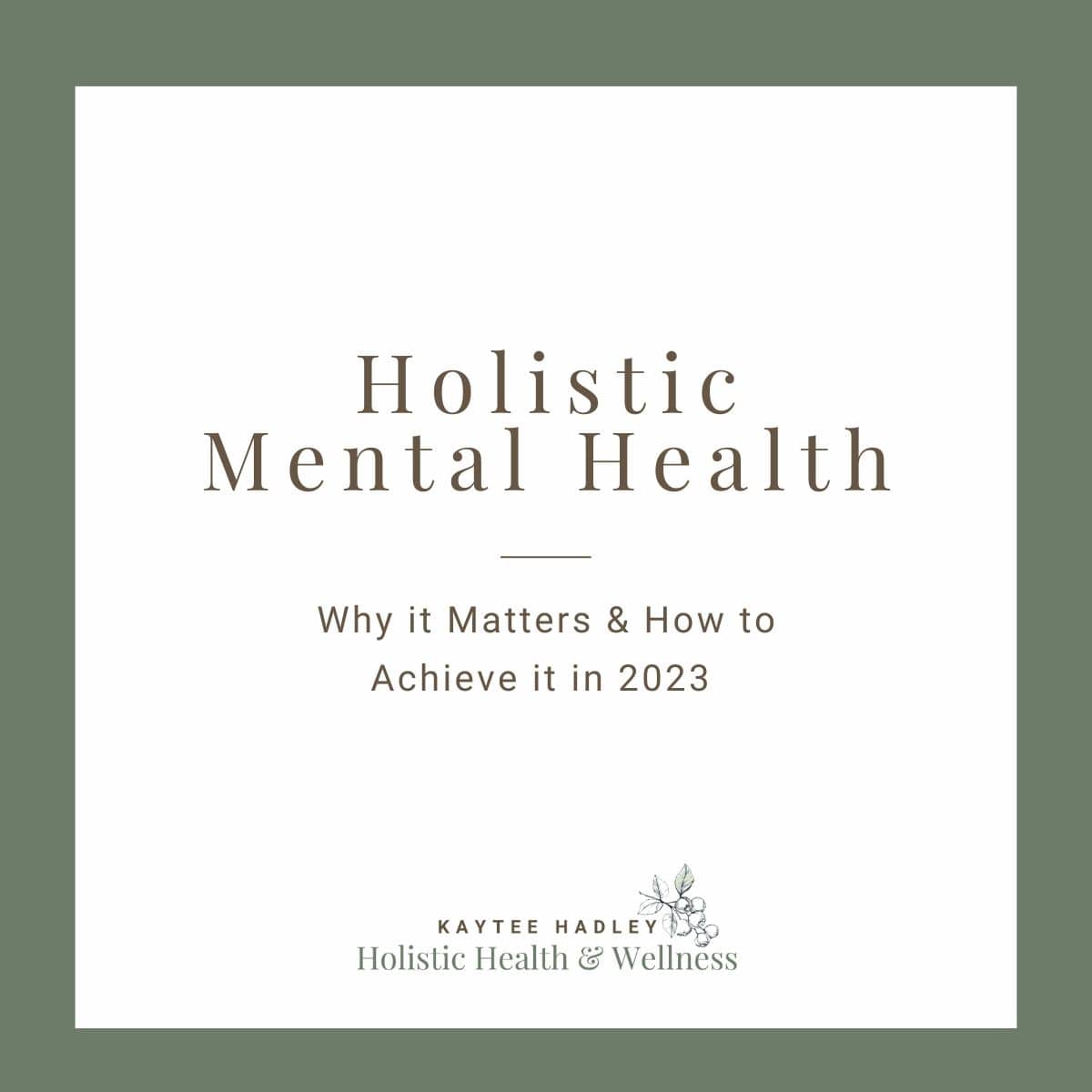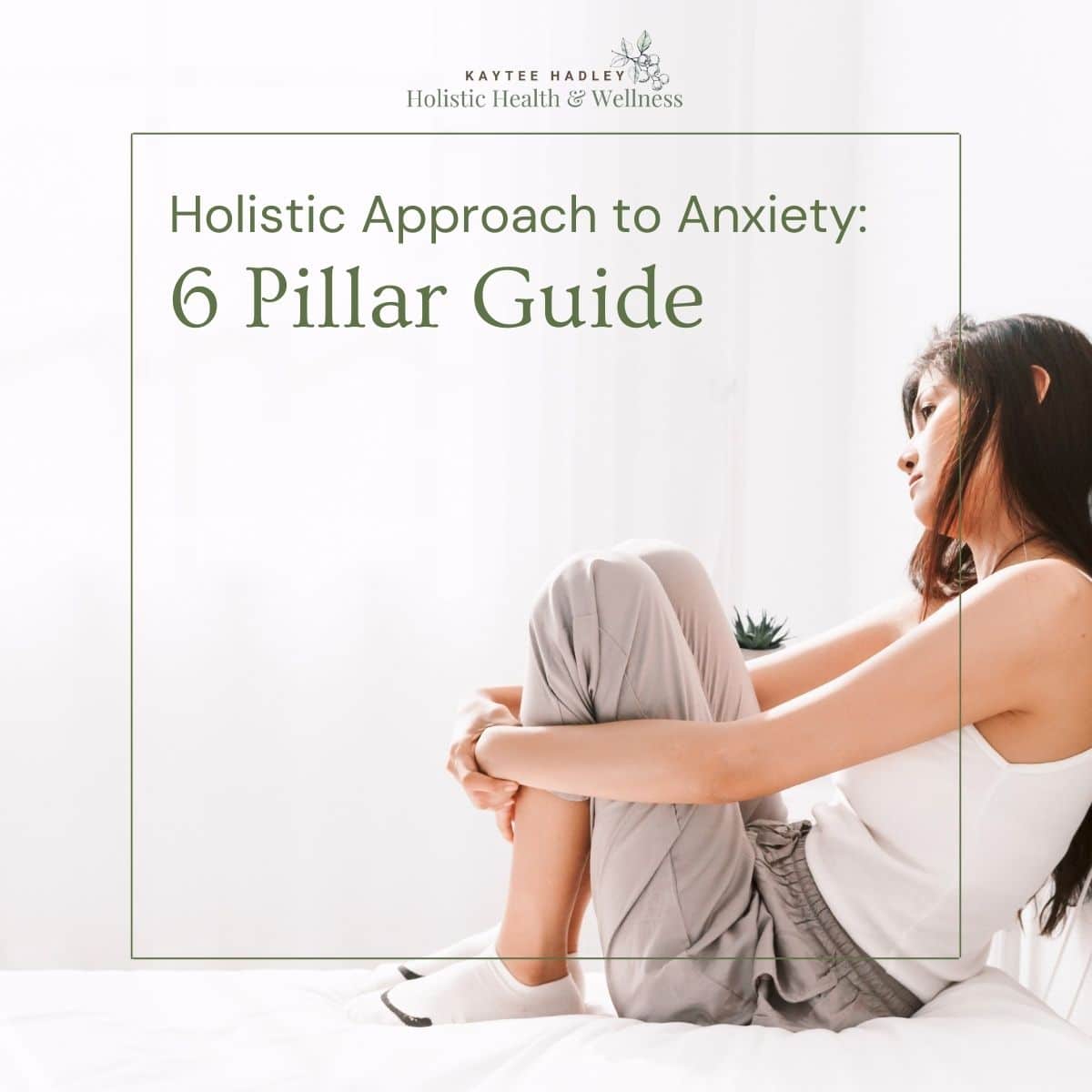This post is coauthored by Taylor Mallory, a former intern at Holistic Health and Wellness.
Did you know that gut health can play a role in hormonal imbalances, including polycystic ovarian syndrome, endometriosis, type II diabetes, thyroid conditions and others?
The gut is the body’s most underrated organ; it is responsible for digesting and absorbing food, protecting us from pathogens via the gut’s immune system, communicating with the brain, and, you guessed it, helping to keep hormones in balance.
When the gut is imbalanced, other systems in the body including hormones are affected!
If you struggle with hormonal conditions or symptoms of abnormal gut function and are ready to take charge of your health – keep reading!
Is There a Relationship Between Gut Health and Hormone Balance?
Table of Contents
Emerging research supports a link between poor gut health and the development of hormonal conditions.
The gut is responsible for absorbing the nutrients required to produce hormones, and the gut microbiome plays a significant role in this process.
Abnormal gut function can lead to an increased risk of inflammation and hormonal imbalance, which can trigger autoimmune conditions, metabolic disorders like diabetes, cardiovascular disease, obesity, mood disorders, and hormonal conditions.
These imbalances can affect the function of many organs and systems in the body.
Hormones
Hormones are chemicals that serve as messengers and play a role in regulating many body processes by signaling what the body needs and when. The hormones, in addition to the tissues and organs that produce hormones, make up the body’s endocrine system.
Gut health status can affect hormone production, transportation, sensitivity and detoxification, which may contribute to hormonal imbalances.
Hormones play a role in:
- Regulating metabolism and homeostasis (internal balance) Growth and development
- Growth and development
- Reproduction and sexual function
- Sleep and circadian rhythm
- Mood and mental health
Which Hormones Can Be Affected?
Well – all of them! There are over 50 hormones in the human body and they each require a delicate balance to maintain function. Estrogen and thyroid hormone are two important examples of the major hormones that can be affected by gut health.
I. Estrogen
The gut microbiome is responsible for activating estrogen. If the gut bacteria are out of balance, this can result in lower levels of circulating estrogen which can promote the development of polycystic ovarian syndrome, endometriosis, cardiovascular disease, obesity, metabolic syndrome, cancer, and other conditions.
II. Thyroid hormone
Numerous studies have shown that thyroid and autoimmune conditions are often related to inflammation in the body. Enzymes responsible for regulating the thyroid hormones (T3, T4, reverse T4) are found in the walls of the intestine and can be influenced by inflammation.
The gut microbiome has a significant role in regulating the immune system. Up to 70% of the immune system is located in the gut in tissue called the gut associated lymphatic tissue (GALT).
A healthy gut can be beneficial to the immune system, promote thyroid function and overall hormone balance! If you want to read more about this, check out the blog post on gut and thyroid health.
Overview of the Gut
The gut is a complicated system with several organs involved. Let’s break it down!
The gut, also referred to as the gastrointestinal tract (GI), is the organ system that is responsible for digestion and absorption of nutrients, protection from invaders like bacteria and pathogens, and communicating to the brain via the nervous system and hormones.
The GI tract is made up of the mouth, esophagus, stomach, small intestine, large intestine, rectum, and anus. There are also accessory organs that aid the digestion process by releasing enzymes to help further break down food – these are the liver, gallbladder and pancreas.
The small intestine is where the majority of nutrients are absorbed into the bloodstream and sent around the body to fulfill their various functions.
The large intestine, sometimes called the colon, is home to a vast collection of bacteria known as the gut microbiome. Each person has a unique microbiome which is influenced by many factors including diet, lifestyle, how you were born (vaginally vs c-section), if you were breastfed, how many antibiotics you’ve taken and more!
Research is now telling us that the gut and the brain communicate via the vagus nerve – this communication is referred to as the gut-brain axis.
If you have ever had a sinking “gut feeling” or experienced GI upset during times of stress, this signaling between the gut and the brain is likely the reason why.
Signs and symptoms of an Unhealthy Gut
Signs and symptoms of an unhealthy gut can appear all throughout the body, not just the GI tract. These may include (but are not limited to):
- Diarrhea
- Constipation
- Bloating
- Obesity
- Vitamin/Mineral Deficiencies (B12, D3, Mg, K, etc.)
- Food Sensitivities
- Skin Conditions & Acne
- Sugar Cravings
- Allergies
- Fatigue
- Depression and Mood Disorders
- Autoimmune Conditions
- Hormonal Imbalance
How Gut Health Affects Hormones
I. Nutrient Deficiencies
Nutrition plays an important role in gut and hormone health. The gut’s main role is to absorb nutrients which will be used for various bodily processes, including hormone production.
If the gut is not functioning properly it can result in poor absorption leading to nutrient deficiencies and ultimately inadequate hormone production, sensitivity, transportation, or detoxification.
II. The Gut Microbiome
The gut microbiome is a community of trillions of microorganisms which live in the large intestine and have a significant role in the physiology of health and disease.
These microbes have many roles in the body including to help regulate the immune system, digest fiber in food, produce certain neurotransmitters and hormones, and influence metabolism, absorption, and bioavailability of nutrients.
III. Dysbiosis
An imbalance of the gut microbiome results in a condition called gut dysbiosis. These communities of microbes in the gut help produce, activate and eliminate some hormones. In a state of gut dysbiosis, the body can experience hormone imbalance among other consequences.
IV. Leaky gut
The lining of the intestine is made up of cells called enterocytes, where most of the nutrients are absorbed. This barrier separates the gastrointestinal tract from the rest of the body.
Leaky gut occurs when the enterocytes become more permeable, resulting in undigested food particles, bacteria, and toxins passing through these intestinal cells and reaching the bloodstream. This can promote inflammation and cause changes to the gut flora.
Leaky gut can negatively impact hormone balance in the body, with estrogen being particularly susceptible, contributing to conditions such as estrogen dominance.
6 Lifestyle Pillar Approach to Improve Gut & Hormone Health
Lifestyle factors play an important role in maintaining gut, hormone, and overall health. The holistic approach is key for addressing all areas of wellbeing while personalizing for each individual’s unique needs. Here are a few areas to be mindful of in your life:
1. Personalized Nutrition
For someone struggling with gut or hormone issues, making positive changes to the diet is a good place to start.
Eating a colorful, diverse diet is an area where many people struggle and can be as simple as adding in more plants including fruits, vegetables, whole grains, beans, nuts and/or seeds.
2. Functional Fitness
Find ways to move your body that are fun and bring you joy. Exercise does not have to be running or going to the gym, it can be hobbies like yoga, Tai Chi, roller skating, gardening, hiking, etc. Get creative with finding fun activities to incorporate more movement into your day!
3. Optimized Circadian Rhythm
Aim for 7-9 hours of sleep and consider these tips for improving sleep:
- Avoid using your phone, watching TV, or looking at a screen before bed.
- Include a sleep routine that works for you – these routines tell our brain when it is time to shut down and get into sleep mode.
- Try taking a hot shower or bath before bed. The subsequent drop in body temperature after the hot shower/bath helps induce sleep.
4. Daily Mindfulness
Mindfulness practices are a great way to manage stress. Breathing exercises like box breathing can be beneficial for reducing stress. Below is a diagram explaining how to do the box breathing exercise:

5. Reduced Toxic Load
Toxins are becoming increasingly present in our environment, air pollution, the food and water supply, household products, skin care/beauty products, and even inside our bodies – they can be found anywhere!
The goal is to reduce exposure and support your body’s ability to eliminate toxins. For more information, check out this e-workbook on reducing toxic load.
6. Supportive Community
Having a supportive community is important for mental and physical health. There is evidence that indicates a relationship between social support and longevity. Studies have shown that people with social support have a decreased risk of mortality.
Holistic Health and Wellness provides individualized support to identify the root cause of symptoms and provide a food-first approach to achieving health. Schedule a free discovery call to see if we are a good fit for you.
5R Approach to Gut Health
The 6 pillars lifestyle approach to supporting the gut and overall health is the foundation, but if you are already following those recommendations and the gut is still out of balance it may take more than lifestyle intervention.
This is when you need to dig deeper and address any imbalances, which takes a more comprehensive approach. This is when the 5R approach to gut health can be helpful.
The 5R approach is the functional medicine framework for restoring gut health.
Learn more about the 5R approach to healing the gut here.
Key Takeaways
The gut plays a crucial role in digesting and absorbing food, defending against pathogens, communicating with the brain and maintaining hormonal balance – yet it often gets overlooked!
Gut health can have significant effects on hormone balance through nutrient deficiencies due to reduced absorption, and imbalances to the gut microbiome leading to conditions like dysbiosis and leaky gut.
For those struggling with gut issues or hormonal conditions, following the 6 lifestyle pillars can set the groundwork for achieving optimal health.
These lifestyle pillars include personalized nutrition, functional fitness, optimized circadian rhythm, daily mindfulness, reduced toxic load, and supportive community.
For those struggling despite following these lifestyle modifications, a more personalized approach may be necessary. Consider working with a functional medicine practitioner to implement the 5R approach to restoring gut health.
Holistic Health and Wellness provides individualized support to identify the root cause of symptoms and provide a food-first approach to achieving health. Schedule a free discovery call to see if we are a good fit for you.
Bio: Taylor Mallory grew up in a small, historic town called Yorktown located in Southern Virginia. She received her Bachelor of Science degree in Psychology from James Madison University. After graduating, she moved to Los Angeles, California where she realized her passion for nutrition and wellness and decided she wanted to be a Registered Dietitian. She is currently pursuing a Master’s degree in Nutrition, Health-span, and Longevity from the University of Southern California.

Kaytee Hadley MSc RDN IFMCP CPT is a functional medicine dietitian, holistic health coach, and certified personal trainer with a BA in Psychology, MSc in Nutrition, and Institute of Functional Medicine Certified Practitioner. She founded Holistic Health and Wellness to support folks with IBS and chronic GI symptoms who have been let down by the conventional care model to find and address the root causes of their symptoms naturally so they can be symptom free and thrive!


